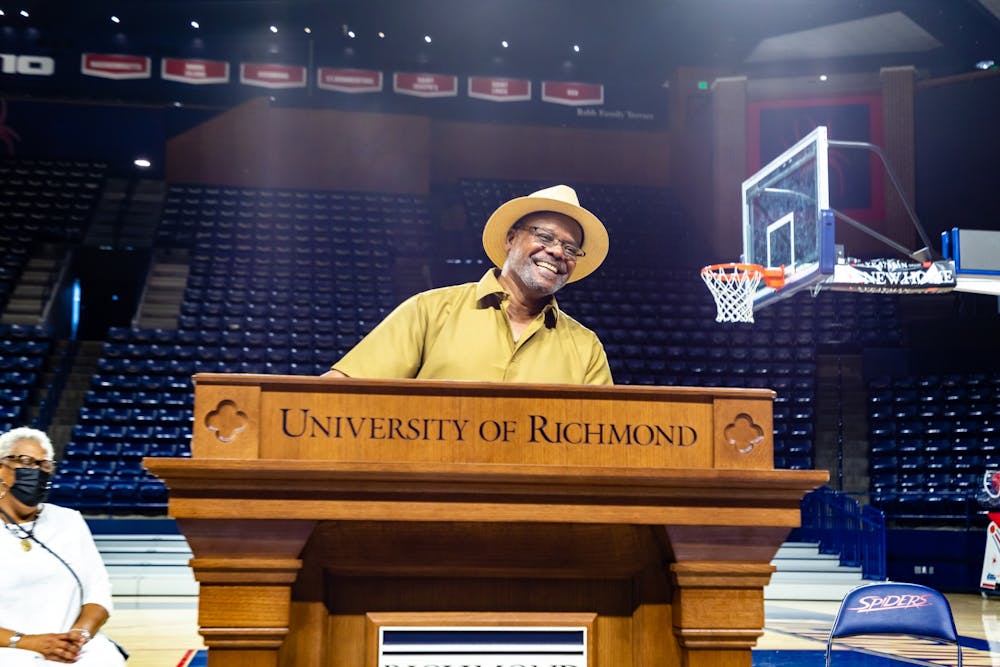This weekend, the University of Richmond football program honored Weldon Edwards, ‘74, who was its first Black football player.
Edwards played as a tailback for the Spiders from 1970 to 1973. In 30 games played throughout his career, he rushed 98 times for 321 yards, caught five passes for 115 yards and scored one touchdown.
Aside from playing football, Edwards also ran for the track team — a sport that led him to the Junior Olympics as a high schooler in 1969. At UR, he most notably won the Southern Conference’s 60-yard dash championship, which sent him to the NCAA Nationals in Detroit, Michigan.
This was not Edwards’ first time being honored. He received a resolution at the Virginia General Assembly in February. There, one of his good friends and former UR football player Del. John Avoli gave him the distinction. Edwards was also honored at a UR basketball game in early March.
“At the time, when he did it, it made me feel pretty proud to be the first Black football player,” Edwards said. “And, you know, as time has gone, 52 years ago, I would start reminiscing on the times that I was there and playing football in Richmond, and it’s come full circle — now I’m getting the university itself.”
UR football head coach Russ Huesman said his wide receivers coach, Winston October, ‘99, was the one who came up with the idea to invite Edwards to spend time with the football players.
But ultimately, Huesman said the biggest idea behind putting this event together was wanting Edwards to tell his story to the football team.
“His story is really interesting,” he said. “So, I think it’s pretty cool that our players hear about the history of Richmond and how we got to where we are now.”
October said that former players had spoken of their appreciation of Edwards and some had decided to come for the celebration.
“It means a lot because our current players need to know the history of the university, other than what is on the surface, and it gives the player something to play for, understanding that there are some guys before you,” October said.
From a more personal standpoint, Edwards played a role in October existing as a fellow Black man on campus, October said.
“With me being a graduate of ‘99, and him being one of the first African American players on campus, some of the things that he did I potentially wouldn’t have been able to be on campus,” he said.
Enjoy what you're reading?
Signup for our newsletter
Coming to UR and accepting a football scholarship with the Spiders was a culture shock for Edwards, he said.
“I came from an all Black high school, all Black players, and when I got to Richmond, it was a totally different culture shock,” he said. “So, I met new people, and I was the only Black player on the team.
And all my teammates were white. But, they all had the same goal in mind: to win, and play together as a team. And that team, that year that I came in, 1970, my classmates were 100% behind me.”
Despite having his team behind him, it was not always an easy road for Edwards. Before he accepted the scholarship at UR, his coach did not want him to go. He also said that he encountered racism as early as his first day on campus.
“My first roommate was from Florida,” he said. “When his parents saw that I was a Black kid, they told the coaches that they didn’t want their son rooming with me. And if I was gonna be his roommate, then they would take their son out of school.”
But, despite the instances of racism he had to endure at UR, Edwards said he wouldn’t trade them for anything because they have taught him a lesson about life and different cultures.
“The reason people don’t see eye to eye is because they never communicate with each other,” he said. “Communication is the key to anything. If I’m doing something one way and you do it another way, then you need to know why I’m doing it like I do. So, we sit down and communicate with each other.”
Over the weekend, Edwards spoke to the team about being the first Black football player, and the diversity he sees now compared to when he was a student. There was also a scrimmage and an opportunity to share a meal with the team, which put an end to an eventful weekend celebrating Edwards and his legacy over 50 years later.
Support independent student media
You can make a tax-deductible donation by clicking the button below, which takes you to our secure PayPal account. The page is set up to receive contributions in whatever amount you designate. We look forward to using the money we raise to further our mission of providing honest and accurate information to students, faculty, staff, alumni and others in the general public.
Donate Now



